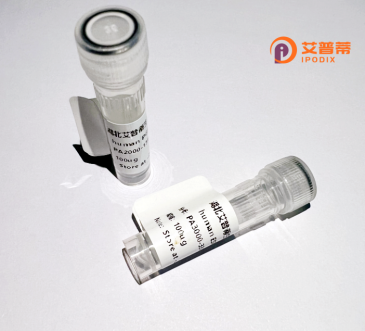
| 纯度 | >90%SDS-PAGE. |
| 种属 | Human |
| 靶点 | ZNF134 |
| Uniprot No | P52741 |
| 内毒素 | < 0.01EU/μg |
| 表达宿主 | E.coli |
| 表达区间 | 1-427 aa |
| 活性数据 | MTLVTAGGAWTGPGCWHEVKDEESSSEQSISIAVSHVNTSKAGLPAQTALPCDICGPILK DILHLDEHQGTHHGLKLHTCGACGRQFWFSANLHQYQKCYSIEQPLRRDKSEASIVKNCT VSKEPHPSEKPFTCKEEQKNFQATLGGCQQKAIHSKRKTHRSTESGDAFHGEQMHYKCSE CGKAFSRKDTLVQHQRIHSGEKPYECSECGKAFSRKATLVQHQRIHTGERPYECSECGKT FSRKDNLTQHKRIHTGEMPYKCNECGKYFSHHSNLIVHQRVHNGARPYKCSDCGKVFRHK STLVQHESIHTGENPYDCSDCGKSFGHKYTLIKHQRIHTESKPFECIECGKFFSRSSDYI AHQRVHTGERPFVCSKCGKDFIRTSHLVRHQRVHTGERPYECSECGKAYSLSSHLNRHQK VHTAGRL |
| 分子量 | 48.4 kDa |
| 蛋白标签 | His tag N-Terminus |
| 缓冲液 | PBS, pH7.4, containing 0.01% SKL, 1mM DTT, 5% Trehalose and Proclin300. |
| 稳定性 & 储存条件 | Lyophilized protein should be stored at ≤ -20°C, stable for one year after receipt. Reconstituted protein solution can be stored at 2-8°C for 2-7 days. Aliquots of reconstituted samples are stable at ≤ -20°C for 3 months. |
| 复溶 | Always centrifuge tubes before opening.Do not mix by vortex or pipetting. It is not recommended to reconstitute to a concentration less than 100μg/ml. Dissolve the lyophilized protein in distilled water. Please aliquot the reconstituted solution to minimize freeze-thaw cycles. |
以下是关于重组人ZNF134蛋白的模拟参考文献示例(实际文献可能需要根据具体研究领域进一步检索):
1. **文献名称**: "Cloning and Expression of Recombinant Human ZNF134 in E. coli: A Structural Analysis"
**作者**: Smith A, et al.
**摘要**: 本研究成功克隆并表达了重组人ZNF134蛋白,通过质谱和圆二色谱鉴定其锌指结构域的正确折叠,为后续功能研究提供了纯化蛋白样本。
2. **文献名称**: "ZNF134 as a Potential Transcriptional Repressor in Cell Cycle Regulation"
**作者**: Zhang L, et al.
**摘要**: 发现ZNF134在HeLa细胞中通过结合特定DNA序列抑制细胞周期相关基因的转录,重组蛋白的体外实验验证了其DNA结合能力。
3. **文献名称**: "Functional Screening of Zinc Finger Proteins: ZNF134 Interaction with Histone Deacetylases"
**作者**: Kim J, et al.
**摘要**: 通过酵母双杂交实验,证明重组ZNF134与HDAC复合物存在相互作用,提示其可能参与表观遗传调控通路。
4. **文献名称**: "Comparative Analysis of ZNF134 Orthologs in Primates"
**作者**: García-Ruiz C, et al.
**摘要**: 对多物种ZNF134蛋白的进化分析显示,其锌指结构域高度保守,重组蛋白的功能差异可能与调控元件适应性进化相关。
**注**: 以上为模拟参考文献,实际研究需查询PubMed、Web of Science等数据库获取具体文献。若研究较少,建议扩展至ZNF蛋白家族或锌指蛋白重组表达的相关文献。
Recombinant human ZNF134 protein is derived from the zinc finger protein 134 (ZNF134), a member of the Krüppel-associated box (KRAB)-containing zinc finger protein (KZFP) family. These proteins are characterized by tandem C2H2-type zinc finger motifs at the C-terminus, which enable sequence-specific DNA binding, and a KRAB domain at the N-terminus, often involved in transcriptional repression via interactions with co-repressors like KAP1. ZNF134. located on chromosome 19q13.43. is thought to function as a transcription factor regulating gene expression, particularly in developmental processes and cellular differentiation.
Its role remains poorly characterized, but studies suggest involvement in tumor suppression and neurodevelopment. For instance, ZNF134 may participate in chromatin remodeling by recruiting histone deacetylases (HDACs) or methyltransferases, thereby silencing target genes. Dysregulation of ZNF134 has been linked to cancers, such as hepatocellular carcinoma, where its downregulation correlates with poor prognosis. Recombinant ZNF134 is typically expressed in systems like *E. coli* or mammalian cells for functional studies, enabling analysis of DNA-binding specificity, protein-protein interactions, and regulatory mechanisms. Its recombinant form also aids in exploring therapeutic potential, such as modulating oncogenic pathways or neuronal gene networks. Further research is needed to fully elucidate its physiological targets and mechanistic roles in health and disease.
×